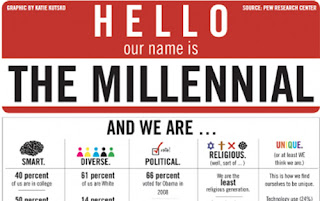Generational Temptations, Pt. 2
I'm reading a new book called "Generational IQ," by Haydn Shaw. It's about the four generations in the church and the strengths and temptations of each. I am technically a Millennial, which spans those born from 1981-2001. But those who are on the border of generations — as I am being born in 1981 — often vacillate between two generations. That's certainly how I felt in reading the book. I identified with traits of both Generation X (Born 1965-1980) and Millennials. Over the next two posts I'm going to look at the temptations of each generation and how I related.
Millennials (1981-2001)
Temptations:
* They Miss The Contradictions In Their Morality
* They Miss The Power and Importance of the Church
* Their Christianity Has Been Hacked
They Miss The Contradictions In Their Morality:
This is an off-shoot and growth of the Generation X danger of making their own truth. This is probably something I see in my generation a lot, and something that has led to people falling away from the church. That is also a by-product of the third point, but more on that later. But when there is no absolute truth, as in Scripture, you can't have an absolute moral code. That causes contradictions.
They Miss The Power and Importance of The Church:
This one really hit home to me. It was something I experienced a lot in college — a Christian college, ironically. Part of it goes along with a cynical view of institutions and the church. But really, for Millennials, it's easy to fall into the trap that the church isn't necessary for faith. Ironically, if you hold to Scripture, nothing could be further from the truth.
I remember when I was in college I fell into that trap, too. I was in a Christian environment. I went to Bible classes weekly. I went to chapel weekly. So I saw no need to go to church on Sundays and be part of a faith community. I was a Christian, and I got more out of personal study. Sadly, that carried over into my post-collegiate life. There was never a time when I didn't consider myself a Christian, but there was a three year period after college where I never attended a church service. I didn't think I needed it in my life, and I didn't want it.
When I finally went back —after God practically shoved church down my throat to get me to see what I was missing — I realized I had been missing something in my life, and that was being part of a vibrant community of faith. Church is about more than knowledge, it's about relationship. There is strength and beauty in that. Having been away for so long — and being on the brink of having been so far away I might never have come back — I saw that.
Sadly, many in my generation don't see that. They see value in being "Spiritual" but no value in being part of the church. I've heard many say they believe in Jesus, but not in His bride, the church. Part of that is the fault of the church, but part of that is a mentality that fails to appreciate what Scripture says about the value of being part of a community of faith.
Their Christianity Has Been Hacked:
Shaw lays out a compelling case that we don't really understand Biblical Christianity anymore. We have a watered down version that talks about acting good, doing good, and remembering God is watching. It's become a somewhat shallow works-based faith, and it's being rejected by Millennials, who crave authenticity.
I have always been draw to the conflict. My favorite kind of music is one where the beat and time signatures feel in tension. My favorite kind of films are those that push against my world view. I have always craved something that forces me to go deeper. So I have done that in my faith. But many of my peers don't, and absent Biblical knowledge and grounding in the truth of Scripture, the version of Christianity often being distilled rings hollow.
That is a challenge that the church must strive to move past.




Comments
Post a Comment